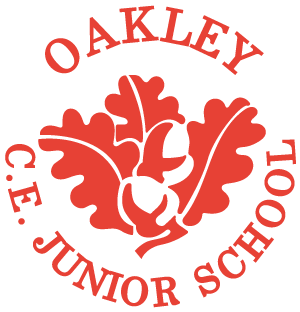British Values
British Values Statement
The DfE have recently reinforced the need “to create and enforce a clear and rigorous expectation on all schools to promote the fundamental British values of democracy, the rule of law, individual liberty and mutual respect and tolerance of those with different faiths and beliefs.”
Oakley CE Junior School is committed to serving its community and surrounding areas. It recognises the multi-cultural, multi-faith and ever-changing nature of the United Kingdom, and therefore those it serves. It also understands the vital role it has in ensuring that groups or individuals within the school are not subjected to intimidation or radicalisation by those wishing to unduly, or illegally, influence them.
The school, accepts admissions from all those entitled to an education under British law, including pupils of all faiths or none. It follows the policies outlined by its governing body regarding equal opportunities, which guarantee that there will be no discrimination against any individual or group, regardless of faith, ethnicity, gender, sexuality, political or financial status, or similar. It seeks to serve all.
The Government emphasises that schools are required to ensure that key ‘British Values’ are taught in all UK schools. The government set out its definition of British values in the ‘Prevent Strategy’ – values of:
• Democracy
• The rule of law
• Individual liberty
• Mutual respect
• Tolerance of those of different faiths and beliefs
Democracy
Democracy is common within the school where the promotion of democratic processes, fostering the concept and application of freedom of speech and group action to address needs and concerns, are heard through our School Council. Other Leadership groups exist for pupils to have their say through for example, Sports Leaders, Digital Leaders and pupil questionnaires. Also key to this is the concept of holding others to account, including those in positions of authority and influence. To inspire our children we have arranged visits to the Houses of Parliament. Our school behaviour policy also involves rewards, the choice of which pupils are involved with.
Children have many opportunities for their voices to be heard. Examples of ‘pupil voice’ are:
- children agree their Class Charter and the rights associated with these; all children contribute to the drawing up of the charter
- children have the opportunity to nominate and vote for others members of the school council
- using Pupil Feedback forms, children are asked to respond and reflect on the teaching and learning
- children nominate various charities, which we support over the course of the year
Pupils are always listened to by adults and are taught to listen carefully and with concern to each other, respecting the right of every individual to have their opinions and voices heard. We encourage pupils to take ownership of not only their school but also of their own learning and progress. This encourages a heightened sense of both personal and social responsibility and is demonstrated on a daily basis by our pupils.
The Rule of Law
The importance of laws, whether they be those that govern the class, the school, or the country, are consistently reinforced throughout regular school days, as well as when dealing with behaviour and through school assemblies. The values of trust and respect are used to help children understand the importance of laws. Pupils are taught the value and reasons behind laws, that they govern and protect us, the responsibilities that this involves and the consequences when laws are broken. Visits from authorities such as the Police, Fire Service etc. are regular parts of our calendar and help reinforce this message.
Individual Liberty
Within school, pupils are actively encouraged to make choices, knowing that they are in a safe and supportive environment. As a school we educate and provide boundaries for young pupils to make choices safely, through provision of a safe environment and empowering education. Pupils are encouraged to know, understand and exercise their rights and personal freedoms and advised how to exercise these safely, for example through our E-Safety and PSHE lessons. Whether it be through choice of learning challenge, of how they record, of participation in our numerous extra-curricular clubs and opportunities, pupils are given the freedom to make choices.
Mutual Respect
The school’s core Leadership skills and behaviours have been part of discussions and assemblies and children have an excellent understanding as to what this means and how it is shown. These ideas are reiterated through the curriculum, the school and classroom rules, as well as our behaviour policy. Additional support is provided for individual pupils, through our trained ELSA (Emotional Literacy Support Assistant) who provides pastoral support. This support helps to develop self-esteem and to practise strategies pupils can employ to help improve their respect of others.
Understanding of those of Different Faiths and Beliefs
Oakley CE Junior School enhances pupils understanding of different faiths and beliefs through religious education studies.
Should you feel that the school is not meeting this requirement, you should contact the school office and request to express your concerns with the Headteacher. Likewise, if you feel that anyone working at the school is, intentionally or otherwise undermining these values, you should report this to the Headteacher.
